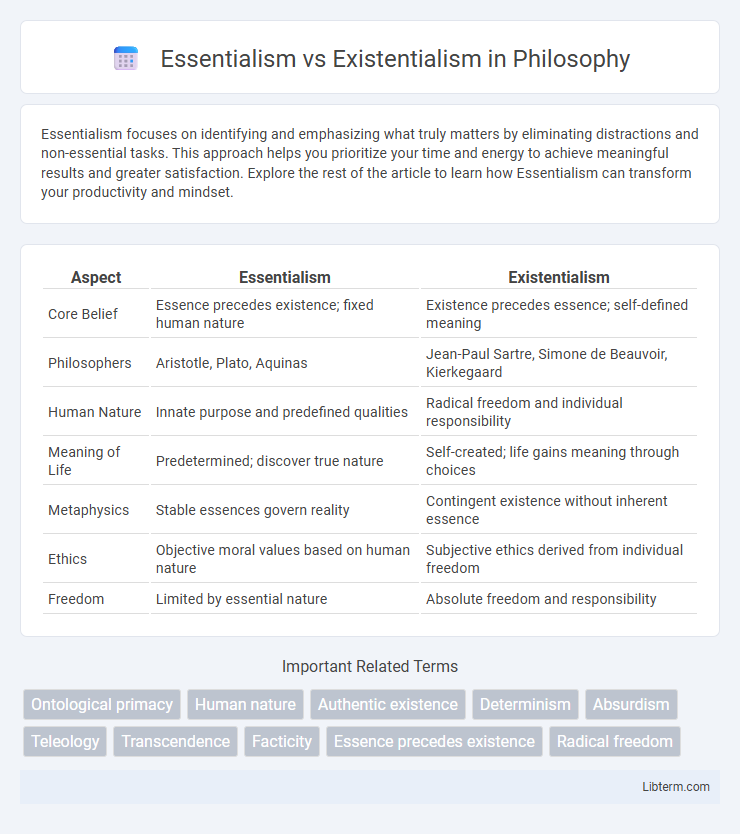Essentialism focuses on identifying and emphasizing what truly matters by eliminating distractions and non-essential tasks. This approach helps you prioritize your time and energy to achieve meaningful results and greater satisfaction. Explore the rest of the article to learn how Essentialism can transform your productivity and mindset.
Table of Comparison
| Aspect | Essentialism | Existentialism |
|---|---|---|
| Core Belief | Essence precedes existence; fixed human nature | Existence precedes essence; self-defined meaning |
| Philosophers | Aristotle, Plato, Aquinas | Jean-Paul Sartre, Simone de Beauvoir, Kierkegaard |
| Human Nature | Innate purpose and predefined qualities | Radical freedom and individual responsibility |
| Meaning of Life | Predetermined; discover true nature | Self-created; life gains meaning through choices |
| Metaphysics | Stable essences govern reality | Contingent existence without inherent essence |
| Ethics | Objective moral values based on human nature | Subjective ethics derived from individual freedom |
| Freedom | Limited by essential nature | Absolute freedom and responsibility |
Introduction to Essentialism and Existentialism
Essentialism asserts that individuals possess a predefined essence determining their purpose and identity, emphasizing inherent traits and universal truths. Existentialism, contrastingly, proposes that existence precedes essence, highlighting personal freedom, choice, and the creation of meaning through lived experience. Both philosophies explore human nature but diverge on whether essence is intrinsic or constructed through individual agency.
Defining Essentialism: Core Principles
Essentialism asserts that entities possess a set of inherent characteristics or essence that define their identity and purpose before existence, emphasizing universal truths and fixed nature. Core principles include the belief that essence precedes existence, meaning the fundamental nature of a being determines its function and value. This philosophical stance often contrasts with existentialism by prioritizing predetermined meanings over individual freedom and choice.
Key Thinkers of Essentialism
Essentialism, grounded in the idea that essence precedes existence, is primarily shaped by key thinkers such as Aristotle, who emphasized fixed categories and inherent purposes, and Rene Descartes, who contributed to the notion of a defined human nature through rationality. Other influential essentialists include Thomas Aquinas, who integrated Christian theology with Aristotelian essence, and John Locke, whose theories on identity and substance reinforced essentialist views. These philosophers collectively assert that core characteristics determine an entity's identity before its existence in the world.
Defining Existentialism: Core Principles
Existentialism emphasizes individual freedom, choice, and responsibility as fundamental to human existence, rejecting predetermined essence before existence. It anchors meaning in personal experience, confronting themes like absurdity, alienation, and authenticity. Key figures such as Jean-Paul Sartre and Soren Kierkegaard highlight the necessity of creating one's essence through actions in an inherently meaningless world.
Key Figures of Existentialism
Key figures of existentialism include Jean-Paul Sartre, who emphasized radical freedom and personal responsibility, and Soren Kierkegaard, often regarded as the father of existentialist thought with his focus on individual faith and angst. Friedrich Nietzsche challenged traditional values and introduced the concept of the "Ubermensch" or "Overman," advocating for self-overcoming. Simone de Beauvoir contributed to existentialism by exploring the intersection of freedom and gender, especially in her work on feminist existentialism.
Main Differences Between Essentialism and Existentialism
Essentialism asserts that individuals have a predetermined essence or nature that defines their purpose, whereas existentialism emphasizes personal freedom and the creation of one's own meaning through choices. Essentialists believe that human characteristics and values are fixed and universal, while existentialists argue that existence precedes essence, meaning identity is not defined until experienced. These core differences highlight a fundamental divide: essentialism prioritizes inherent nature, existentialism prioritizes individual existence and subjective experience.
Essentialism in Modern Education and Society
Essentialism in modern education emphasizes core knowledge, structured curricula, and teacher-centered instruction to cultivate foundational skills critical for academic and social development. This philosophy prioritizes discipline, standardized testing, and a systematic approach to learning that prepares students for civic responsibility and workforce demands. In society, Essentialism supports traditional values and roles, asserting that fixed essences or characteristics define individuals and cultural expectations, driving educational policies that reinforce cultural continuity and societal stability.
Existentialism’s Influence on Individual Freedom
Existentialism emphasizes individual freedom by asserting that humans create their own essence through choices and actions, rejecting predetermined nature or purpose. Philosophers like Jean-Paul Sartre argue that this radical freedom carries responsibility, shaping authentic existence despite inherent absurdity and anxiety. This philosophy profoundly influences modern thought on autonomy and self-determination, encouraging personal meaning-making in an indifferent universe.
Real-World Applications of Essentialist and Existentialist Thought
Essentialism shapes real-world applications in education by emphasizing foundational knowledge and core skills critical for academic success and societal stability. Existentialism drives therapeutic practices and leadership models that prioritize individual freedom, authentic experiences, and personal responsibility, fostering innovation and self-actualization. Organizations applying essentialist principles often focus on standardized processes, while existentialist approaches encourage creativity and adaptive problem-solving in dynamic environments.
Conclusion: Choosing Between Essentialism and Existentialism
Essentialism posits that individuals have a predetermined essence that defines their purpose, while existentialism argues for creating one's own meaning through freedom and choice. Choosing between essentialism and existentialism depends on whether one prioritizes inherent nature or self-determined identity. This philosophical decision shapes approaches to morality, purpose, and personal responsibility.
Essentialism Infographic

 libterm.com
libterm.com